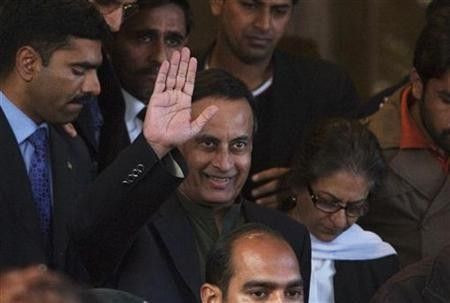Former Pakistani Envoy to United States Defiant in Coup Memo Hearing

Pakistan's former ambassador to the United States denied any involvement in drafting a memo that accused the army of plotting a coup and suggested on the first day of a Supreme Court commission on Monday he was being framed.
Former envoy Husain Haqqani struck a defiant tone that was sure to do little to quell a scandal that has dominated Pakistani politics for the past three months and destabilised the civilian government amid rumours of a military takeover.
I had no role in creating, drafting and/or delivering the memorandum to the U.L Chairman Joint Chiefs of Staff Admiral Michael Mullen, Haqqani said on Monday. I have no knowledge of the origin, authenticity or purpose of the said memo.
The murky scandal emerged last October when businessman Mansoor Ijaz, writing in a column in the Financial Times, said a senior Pakistani diplomat had asked that the memo, seeking help to rein in the military, be sent to the U.S. Defense Department.
Ijaz says he wrote the memo following the secret U.S. raid that killed Osama bin Laden in a Pakistani garrison town, embarrassing the Pakistani military. No evidence has emerged that the military was plotting a coup and the Pentagon at the time dismissed the memo as not credible.
Ijaz later identified the diplomat as Haqqani, an ally of President Asif Ali Zardari and who says he was never liked by the military because of his advocacy for civilian supremacy.
Ijaz says Haqqani conceived and dictated the memo in a May 9 phone call between the two.
Haqqani denies the phone call was about the memo and says Ijaz has fabricated the controversy, which has been seized upon by Pakistani media and political opponents, for his own reasons.
FALSELY ACCUSED
I was falsely accused in the media and (by) Mr. Ijaz of being the person that communicated the contents of the memo, said Haqqani, dressed in a grey suit with a Pakistani flag pin on his lapel.
Outspoken elements of the Pakistani media, steeped in anti-American rhetoric, have labeled Haqqani a traitor. Haqqani returned to Pakistan in November and resigned as ambassador in a bid to end the crisis, but petitions by opposition members to the Supreme Court led to Monday's judicial commission.
Ijaz has said he would appear before the commission but wants guarantees for his safety before traveling to Pakistan, he told Reuters on Monday, although he could take part via video-conference if he was unable to come in person.
I have insisted on being physically present and have instructed my counsel to not consider other options unless the government refuses permission for me to come, he wrote in an email to Reuters.
Ijaz has said Haqqani and the government were orchestrating a cover-up of their roles in the memo controversy.
Memogate, as the Pakistani media have dubbed the scandal, encapsulates the two issues that have troubled Pakistan for decades: the relationship between the military and civilian government and Pakistan's ties with the United States.
Friction between the civilian leadership and the generals has bedeviled the nuclear-armed South Asian country for almost its entire existence, with the military ruling for more than half of its 64-year history after a series of coups.
The situation is so tense that in December, when Zardari flew to Dubai for medical treatment, it sparked rumours that he had fled the country before a military coup.
Army chief General Ashfaq Kayani last month dismissed the coup rumors as speculation and said the army supported democracy. Zardari returned after about two weeks.
© Copyright Thomson Reuters 2024. All rights reserved.





















